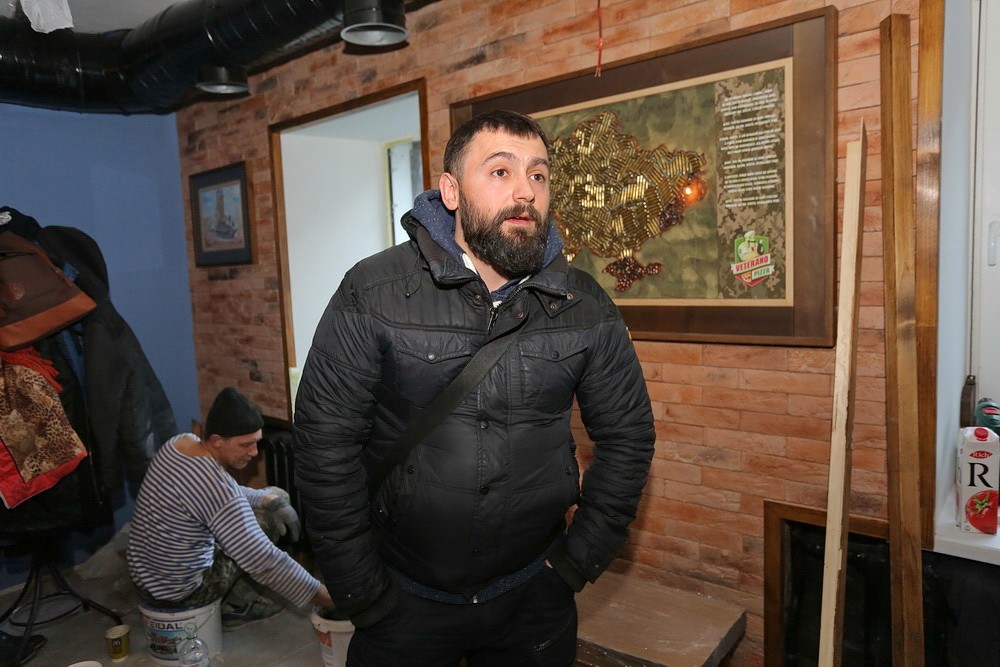Leonid Ostaltsev, 30, a tall dark-haired Ukrainian veteran of the Donbas war, became famous in 2015 when he opened Pizza Veterano, a Kyiv pizzeria run by former soldiers.
But a year later, Veterano was forced to relocate from its premises in Metrograd shopping mall because the landlord decided to sell the space.
The café ended up at 8 Sofiyivska St., next to Maidan Nezalezhnosti Square. Ostaltsev talked to the Kyiv Post as his staff rushed to complete the final touches before the grand re-opening scheduled for Jan. 28.
The veteran looked tired but happy. For him, as for many other former soldiers who fought in the Donbas, business has become a new passion that gives meaning to life.
As of January, there were more than 200,000 war veterans in Ukraine, according to the State Veterans Affairs Service data. The actual number is bigger and includes those who didn’t apply for veteran status.
Starting anew
Many war veterans do not go back to their pre-war jobs, according to Antonina Bondarenko, CEO of the Leadership School for Veterans. Some veterans find relief in starting their own businesses. “And we observe this trend not only in Kyiv but all over Ukraine,” Bondarenko said.
To help each other, they unite in veteran business associations, continuing the brotherhood that they fostered in the Donbas, defending against the Russian-instigated war that has been going on since 2014 at a cost of 10,000 Ukrainian lives.
Proven success
Vira Lebedeva, BizClub business incubator training program director, told the Kyiv Post on Jan. 25 that veteran businesses are usually looked upon favorably by grateful Ukrainians.
To re-open his pizzeria, Ostaltsev went deep into debt. He owes money to nine investors, but has no doubt he will return the money. “Hundreds of people keep asking me when we are going to re-open,” Ostaltsev said.
His new place will be more than a pizzeria: Ostaltsev is adding a Veterano Bar with live music to lure more clients. To launch it, Ostaltsev joined forces with another veteran-turned-businessman Bogdan Chaban, who runs a bar in Mariupol, the Azoz Sea port city of 500,000 people in Donetsk Oblast.
Partisan bartender
Chaban, 23, a slender young man with a wide smile and a beard, looks more like a hipster than a soldier. He survived the war’s bloodiest battle in Ilovaisk in the summer of 2014 and then joined a partisan group to fight for his native Donetsk Oblast.
Before the war, Chaban owned Izba Chitalnya café in Donetsk. A popular spot for pro-Ukrainian activists, musicians and writers, the café was forced to close when Russian-backed separatists took over the city in 2014.
Chaban was given 24 hours to leave the city. He joined the volunteer Shakhtersk Battalion, but was determined to re-open his cafe someday.
After demobilization in 2015, Chaban won a Hr 222,000 grant from the United Nations Development Program in Ukraine and re-opened Izba Chitalnya in Mariupol, some 113 kilometers from Donetsk. Chaban wanted to stay close to home.
The new Izba opened its doors in spring 2016 and the business has taken off.
“Having a business is the best way of adaptation after the war,” Chaban said. “Counterintelligence operations, shelling, gunshots, and wounds can be forgotten if you are constantly busy, thinking about your project.”
Cyborg therapist
Dmytro Krykun, 28, is another veteran who pursued a new business to settle into post-war life.
Before the war, Krykun didn’t have a steady career After demobilizing, he felt lost. He changed several jobs when a friend reminded him about his nearly-forgotten dream: to be a masseur. He enrolled into a free massage course for veterans, organized by the Development Center for Free People, an nongovernmental organization helping internally displaced people and veterans.
He took a loan to buy a table and started giving massages to people at their homes. He had four or five clients a day.
“I was really busy but I enjoyed it,” Krykun said. “I like that people come to me in pain and I make them happy with my own hands.”
The long commute exhausted him, so he rented a room from the wife of a fellow veteran and in May 2016 founded the massage parlor, Cyborg Massage. The name is a reference to the Battle for Donetsk Airport which Krykun participated in. Ukrainian soldiers were nicknamed Cyborgs for their long resistance before surrendering the ruined grounds in January 2015.
“Now I’ve found the new meaning of life,” Krykun said.

Leonid Ostaltsev, Ukrainian Army veteran speaks to the Kyiv Post during the tour in the new Pizza Veterano location on Sofiyivska Street in Kyiv on Jan 25, three days before the re-opening. (Volodymyr Petrov)
Beauty business
Oleh Levitskiy, a former soldier of the Kyiv Defense Battalion, took part in military operations near Luhansk Airport and Debaltseve. After he was demobilized in 2015, he switched military operations to beauty makeovers. Together with his wife, Nataliya, he founded a chain of hairdressing salons in Kyiv, called Maraphet.
They decided to open the business back in 2014 after his wife’s boss, a hair stylist, didn’t let her take time off during Levitskiy’s short trips home. “We didn’t want anybody to control our lives anymore,” said Levitskiy.
Reality bites
Bondarenko has seen many talented veterans with creative business ideas but, she said, very few of them decide to go through with their idea.
“Many of them think that because they served in the army, our country should provide some special conditions for them, others feel new and insecure in a tough business field,” Bondarenko said. “But some veterans are lazy and don’t want to even write a simple business plan.”
The Leadership School for Veterans was founded with the financial help of the U.S Embassy in Ukraine and several civic organizations. Bondarenko said the Ukrainian government should pay more attention to help Donbas war veterans.
“The government should help with the basics – lack of education, social presentation and communication skills,” said Bondarenko.
